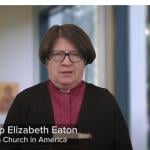Trump comes for the trees by ordering the ecocide of 280 million acres of forests. Christians who care about God’s Creation must speak out.
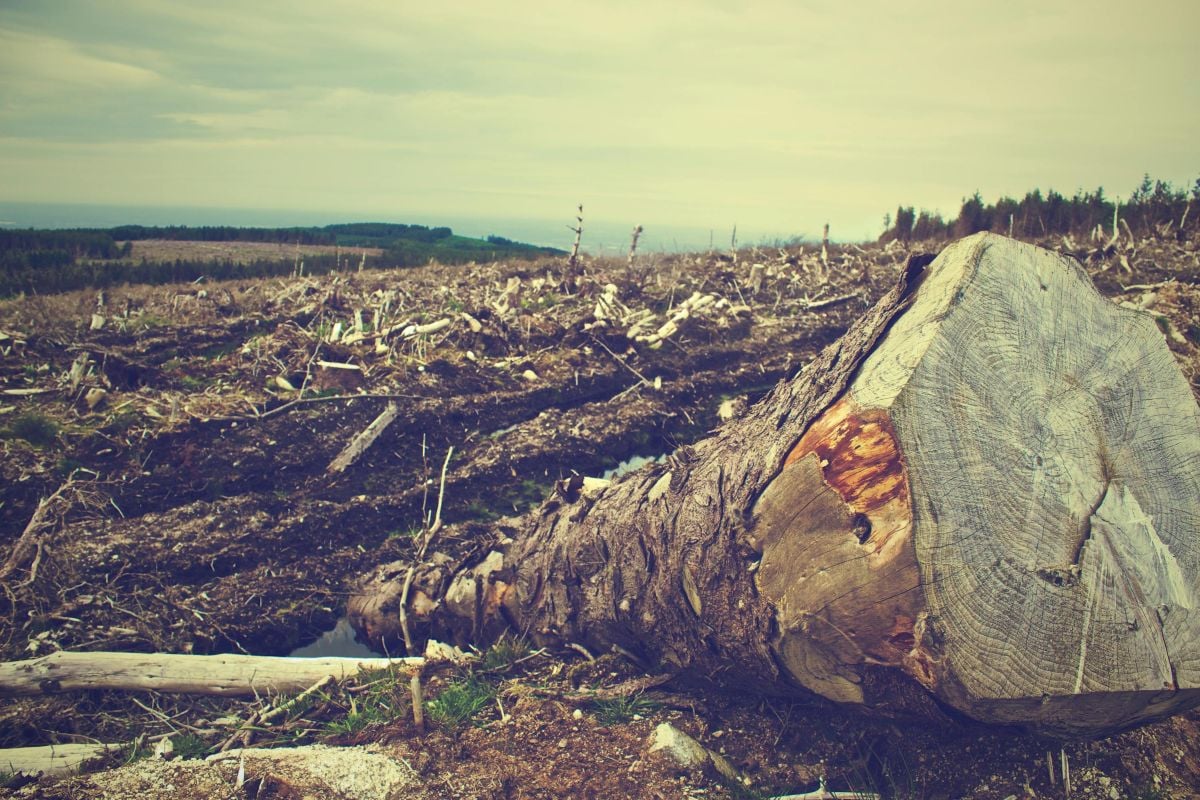
On March 1, 2025, Donald Trump issued an executive order entitled “Immediate Expansion of American Timber Production.” The order directs federal agencies to cut across 280 million acres of national forests and other public lands.
The consequences of this executive order will be dire.
280 million acres equates to 437,500 square miles. This is the equivalent of cutting across the state of Montana, the fourth largest state by land area in the union, three times over.
To increase the volume and speed of the US Forest Service and Bureau of Land Management logging our national heritage, Trump has instructed them to circumvent the Endangered Species Act. They are ordered to ignore protections placed upon vulnerable creatures’ habitats and sensitive ecosystems that provide for the health of these lands and surrounding human communities.
I’m an ordained Christian minister and seminary professor who teaches courses about our sacred duty to protect God’s Creation.
From my perspective, this executive order is sinful, evil, corrupt, and heartless.
If you are a Christian and think this executive order is a good thing, then this article is not for you.
If you need to be convinced that this action is not only illegal, but a sin that will result in the devastation to God’s Creation on orders of magnitude, then simply move along. I cannot help you if your heart and brain are calcified to the point where you think you can argue that this executive order is anything more than a sell-out to the logging industry and corporate billionaires.
But if you are a person of faith who is feeling angry, devastated, and kicked in the gut by this executive order, I offer this furious, faithful lament. And a call to action.
Let’s be clear. These are public lands. They are held in trust for the American people and future generations.
Untouched forests are huge “carbon sinks,” meaning that they absorb the carbon dioxide that is playing havoc with the climate. Old-growth forests preserve critical migratory routes for countless species. Also, the resiliency of local, regional, and global communities depends on functioning natural systems that can withstand threats through adaption and change.
The longer we protect these lands – and the more lands we place under protection – the better it will be for everyone, human and other-than-human alike.
But Trump is coming for the trees. And we will all feel the ripple effects of this devastation.
In an article for The Guardian, Chad Hanson, wildfire scientist at the John Muir Project shared his thoughts about the unprecedented giveaway of precious, irreplaceable forests to corporate interests.
“The executive order is built on a lie, as Trump falsely claims that more logging will curb wildfires and protect communities, while the overwhelming weight of evidence shows exactly the opposite,” says Hanson.
He explained that logging changes the microclimate of forests. The result is hotter and drier conditions that allow wildfires to spread faster, such as what happened in Los Angeles.
Even Biden caved.
The federal commitment to protect old-growth forests had already begun to crumble under the Biden administration. Obeying in advance and bowing to the timber industry, Biden paused the old-growth protection plan in January 2025.

Now Trump comes for the trees with this executive order, along with his chainsaw-wielding henchman Elon Musk who fired 2,000 workers in the Forest Service. And with corporate lobbyist Tom Schultz as the next Forest Service chief, our national woodlands are slated to be sold off to billionaires and corporate polluters.
“What does this have to do with the church?” you might ask.
The answer is that protecting these forests is a matter of faith. As Trump comes for the trees, we must speak up for the land, the woods, waterways, and our Earth kin who live there. Otherwise, we are shirking our sacred responsibility. It is our duty both to protect God’s Creation and the children who will inherit these wastelands. Because our children have no say in this decision.
How can we welcome children into these places God has created if there is nothing left to welcome them into? Or if we have turned these sacred places into industrialized zones that are no place for children to play and explore? Or if we have so poisoned and compromised the integrity of the land that we leave our children with nothing but a memory and an internet video reminding them of how it used to be?
Seeing clear-cut forests as a child planted seeds for me to be an advocate for God’s Creation.
Near my childhood home, there was a wooded area where my friends and I would gather to play, build forts, and simply daydream under the trees’ sheltering green canopy. In a single day, the bulldozers razed the trees and leveled the landscape to make room for student housing for the local college campus.
At my family’s hunting camp in Pennsylvania, my hikes through the mountains felt like walking among cathedrals grander than any church I had ever seen. But one day I came upon a scene that looked as if a bomb had exploded. The roots of trees were ripped from the ground and the carcasses of oak, maple, and pine were laid out for “harvesting.” I felt gutted as if my friends had been murdered and their bodies sold to the highest bidder.
The clear-cutting of these sacred forests seared into my young heart and mind a resolve to say something.
In the face of people and economic forces that cared nothing for the squirrels, birds, turkeys, deer, and children who had called these places “home,” I was determined to speak up.
I instinctively felt an intimate connection between these sacred places in nature and my own small self. It was a connection that felt deeply violated whenever I helplessly witnessed the destruction of these wild landscapes.
When I eventually became a pastor, I preached sermons about protecting natural lands, oceans, and the very atmosphere of our planet. I started an ecology ministry so our church could do something by educating, advocating, and activating Christians for this sacred vocation. And I fought the fracking industry and helped organize a local action to keep a tire incinerator out of a rural community.
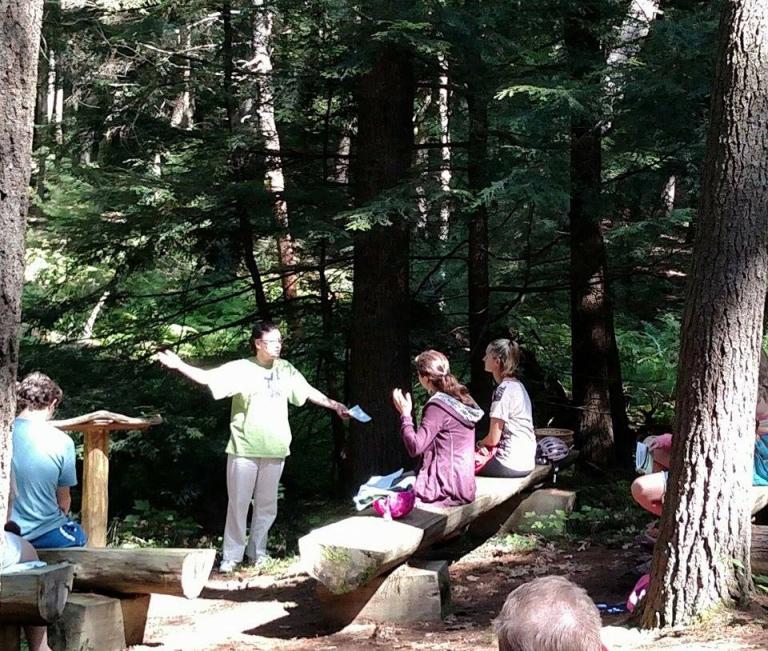
Now I study how clergy and congregations see the relationship between environmental justice and faith.
I came to the question of preaching and environmental issues from my collaborative work with several partners who created a program called the EcoPreacher Cohort.
In March 2024, Lexington Theological Seminary (LTS), where I teach preaching and worship, received a $1.25 million grant from Lilly Endowment Inc. for our project, “Compelling Preaching for a Climate-Changed World.” LTS is partnering with The BTS Center and Creation Justice Ministries on the initiative that aims to equip preachers with training, resources, support networks, and research for addressing the urgency of the climate crisis and other environmental issues.
People of faith do care about the natural world!
As part of our program, we conduct surveys of the preachers as well as their congregational leaders. Since 2022, we’ve found that both groups score very high (85-90%) on concern about the environment and climate change. Congregational leaders consistently score in the 90th percentile agreeing that connecting their faith and love of nature is important to them. The majority say that they would like to see their congregation get more involved with caring for the environment.
Also, when asked what motivates them to care for the Earth, their primary concern is about future generations (80%), as well as animals, plants, forests, beaches or other geographic places (75%). Three-quarters (74%) of congregants pointed to scripture and religion calling them to care for the environment. Two-thirds (67%) connected their faith to love of nature as an important concern.
Granted, these are mostly mainline Protestant congregants. But a 2022 Pew survey found that 86% of evangelicals agree that God gave humans a duty to protect and care for the earth. Half of evangelical adults aged 40 and up said they would be willing to make sacrifices in the way they live today if they knew it would help future generations. That number jumps to 61% among those aged 18-30. However, we must also note that evangelicals are generally less likely to believe in climate change, much less do anything about it.
Show some restraint!
Chapter 3 of Genesis shows us that God set limits for human beings in how they were to exist in the garden. They were forbidden from eating the fruit of the Tree of knowledge. For the good of Adam and Eve, for the good of the tree, for the good of the entire garden, God essentially said: “This far and no farther.”
God established a boundary for the mutual protection of the relationship between humankind and the created world.
Did the original humans respect these boundaries? No.
They did not obey the limits God set for them. They ignored the warnings, flouted the rules, and crossed the line.
There’s almost a feeling of entitlement you sense from Eve and Adam rationalizing their disobedience. It’s as if they’re saying, “This is our garden after all. God gave it to us. We should be allowed to do anything we want with it. Look, the fruit is good to eat. The sale of the wood and the resources in the ground will enrich us. As the Tempter said, God is just afraid that we’ll know what God knows. And why shouldn’t we know?”
Now we know.
Even before Trump came for the trees, we already knew that there are limits to what Earth can withstand. There are boundaries that need to be established and respected. But we have done more than just cross the line. We have decimated the “garden” of this Earth. And now Trump wants to clear-cut nearly 300 million more acres.
We are living with the consequences of a planet whose climate and landscapes are changing too rapidly for the atmosphere and ecosystems to adapt. At what point to we stand up to Trump and his minions and say, “No more!”?
The forests are worth saving because they are fellow worshipers of God.
Several years ago, I wrote about visiting Blanton Forest Preserve in Kentucky. It was like making a pilgrimage to a place of holiness.
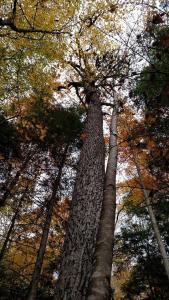
350-year-old trees arched like the vaulted ceiling of a sanctuary. A stream with darting minnows (including some endangered species) flowed down the mountain, its fresh waters reminding me of the source of my own baptism. The congregants were rocks and boulders robed in lichen, spiders weaving their altar linens, and rhododendrons kneeling in prayer – all of them hushed and reverent.
We were walking on holy ground.
This is what we lose if we permit Trump to come for the trees.
The Bible describes nature as worshiping its Creator.
- Psalm 19:1 says “The heavens declare the glory of God; the skies proclaim the work of God’s hands.”
- Isaiah 55:12 declares that ““You will go out in joy and be led forth in peace; the mountains and hills will burst into song before you, and all the trees of the field will clap their hands.”
- John of Patmos heard “every creature in heaven and on earth and under the earth and on the sea, and all that is in them, saying: ‘To him who sits on the throne and to the Lamb be praise and honor and glory and power, for ever and ever!’” (Revelation 5:13)
These are just a few of the biblical passages emphasizing that all of Creation reflects, praises, and testifies to God’s glory.
So when Trump comes for the trees, he will not only be defiling the sanctity of those sacred places. He will be destroying entities that give God glory.
It’s time to speak up and take action
If you are a Christian who cares about God’s Creation, I urge you to put your faith into action and take your sacred responsibility seriously. It’s a charge that was given to humanity in the original Garden when God entrusted them with making sure the natural world flourishes for the entire web of life (Genesis 2:15).
We have an opportunity to witness to our faith and make our voices heard. We must tell our leaders that logging our national forests would be nothing less than the degradation of God’s Creation. Scripture witnesses to God as Creator of the Earth and all that dwells therein (Psalm 24:1). Our leaders need to know that we, as Christians, believe these forests are worth protecting, especially those areas that are particularly sensitive and whose ecosystems are fragile.
How will you disrupt the theft of our national and God-given heritage?
Some will write letters, sign petitions, and show up at the offices of their elected representatives. Others might join protests at the sites where Trump comes for the trees.
In whatever way you feel called to disrupt this theft of our national heritage and desecration of God’s Creation, keep your focus on your faith. God’s presence is infused in all of Creation, including the forest cathedrals that God has created.
We must demand that our leaders leave a legacy for future generations that preserves the unparalleled beauty and necessity of the forests. It is their responsibility to protect and preserve our sacred heritage. And it is our responsibility as Christians to demand that they do so.
Read also:
Preserving the Holy Remnant: Kentucky Natural Lands Trust
A Dozen Bible Passages for Preaching a Creation-Care Sermon
Creation-centered Spiritual Practices Focus Our Lenten Journey
The Sacredness of Trees: Healthy Trees, Healthy People, Healthy Faith, Wk. 3
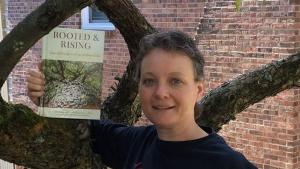
The Rev. Dr. Leah D. Schade is the Associate Professor of Preaching and Worship at Lexington Theological Seminary in Kentucky and ordained in the ELCA. Dr. Schade does not speak for LTS or the ELCA; her opinions are her own. She is the author of Preaching and Social Issues: Tools and Tactics for Empowering Your Prophetic Voice (Rowman & Littlefield, 2024), Preaching in the Purple Zone: Ministry in the Red-Blue Divide (Rowman & Littlefield, 2019) and Creation-Crisis Preaching: Ecology, Theology, and the Pulpit (Chalice Press, 2015). She is the co-editor of Rooted and Rising: Voices of Courage in a Time of Climate Crisis (Rowman & Littlefield, 2019). Her book, Introduction to Preaching: Scripture, Theology, and Sermon Preparation, was co-authored with Jerry L. Sumney and Emily Askew (Rowman & Littlefield, 2023).


